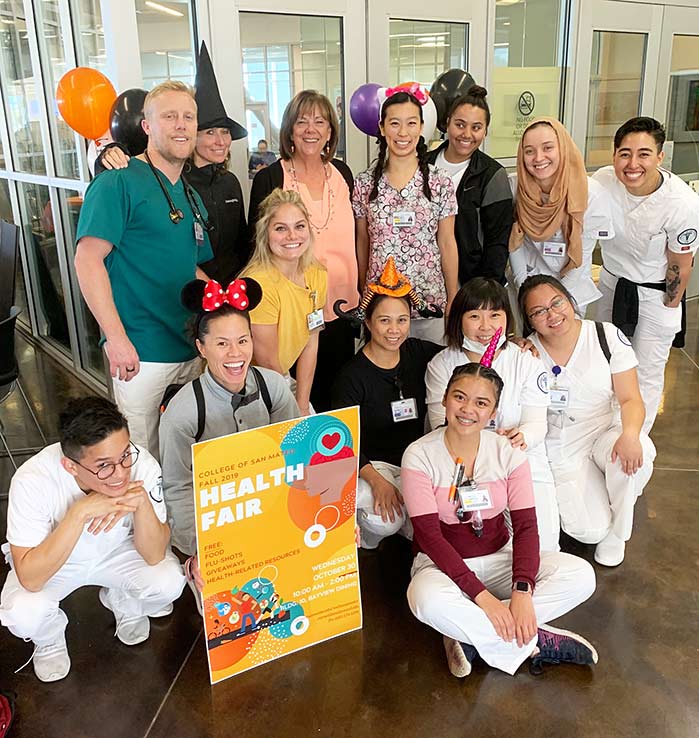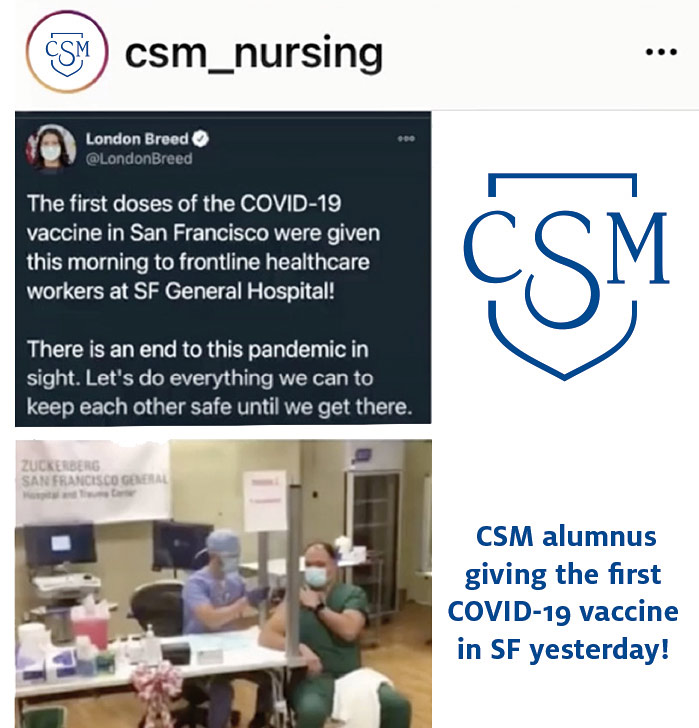Janis Wisherop and CSM Nursing
While other nursing schools had to pause during COVID, CSM’s stayed open and provided care to tens of thousands of people
“I’ve worked in two wars. I’ve worked with Doctors without Borders. I’ve never seen
anything quite as compassionate and professional and loving and caring as these women
and men from CSM.”
– Eleanor Britter, MD, executive director, Lions Global Initiative for Health and Wellness
While the COVID-19 lockdown forced many nursing schools to pause operations, College of San Mateo’s nursing program not only remained open but provided vital health care to tens of thousands of Bay Area residents.
CSM nursing students gave 12,000 COVID and influenza vaccinations at Samaritan House in San Mateo and thousands more at Moscone Center in San Francisco as part of their nursing studies, which San Mateo County declared essential operations during the pandemic.
They gave COVID tests in Redwood City public schools to enable kids to be cleared to go to class. They staffed public health events through nonprofits such as the Bay Area Community Health Advisory Council, giving COVID tests, blood pressure screenings and information on heart health.
CSM could step up because of the strong foundation of its program and the initiative and hard work of Janis Wisherop, CSM instructor for 26 years and nursing department director since 2020.
Quality care in and for the community
With its rigorous academics, modern simulation labs and robust networking for faculty and clinical placements, CSM creates nurses who serve their community and fulfill their dreams.
If anything, COVID underscored and deepened CSM’s mission to provide nurses to provide care for the community it serves.
“What aren’t they doing for me?” said Eleanor Britter, MD, executive director of the Lions Global Initiative for Health and Wellness, whose joint venture with Samaritan House brought CSM nursing students in to give the 12,000 shots.
“They were originally sent to me by Janis because I asked for some volunteers interested in a flu clinic to help me give flu and COVID as well as do the paperwork involved,” Britter said.


“It involved filling the vials from the vaccine containers into the needles and making them ready for the patients. They print out the number of people we have signed up. They prepare the paperwork. They give patients the clipboards to fill out. They administer the vaccine. They give information and handouts in Spanish and English.”
“It’s quite intensive. Every week we go through a full battery of organizing and reorganizing. It’s a complex situation. The vaccine needs refrigeration, and this needs to be monitored. The needles must be refrigerated in another room because we don’t fill the vials in front of people.”
“The students really did pinch-hit. Making sure the coffee was warm, the snacks were out. Kids and parents need a little something after they get their shot. It’s a true clinic. We cater to the underserved.”
“You have no idea unless you see it. I’ve worked in two wars. I’ve worked with Doctors without Borders. I’ve never seen anything quite as compassionate and professional and loving and caring as these women and men from CSM.”
Strong preparation enables CSM to step up
Within days of the COVID lockdown in March 2020, Wisherop and San Mateo County Community College District’s Ray Hernandez had obtained a memorandum of understanding to keep CSM’s nursing program open under state emergency guidelines while the rest of the campus was closed.
“When the pandemic hit we had some things to pivot to,” Wisherop said. “We didn’t have to close the program.
CSM’s Nursing Program operates in CSM’s LEED-certified Building 5, the Health and Wellness Building. It houses a state-of-the-art Nursing Skills Lab, with simulations including a robotic patient for students’ first patient-care steps.
As essential workers, Wisherop said, the program “could expand into other classrooms in Building 5 and keep our social distancing because we were the only ones there.”
The lockdown did affect the students’ second round of “patients,” volunteer actors on whom students practice their intake and plan-of-care skills. So Wisherop and her colleagues recruited friends and neighbors, including Wisherop’s own mother, to step in via remote access.
Test-taking was possible, too. In 2019, CSM nursing upgraded its assessment technology to align with that used by the national nursing boards. Wisherop had written the grant for the department to acquire ExamSoft, which allows electronic assessment of clinical skills.
“That saved our lives,” she said. “We had to give final exams. Some skills you can’t assess with Scantron sheets and pencils. With ExamSoft, students hover their cursors over a virtual patient’s chest, for example, and find the maximal heart rate.”
Though students couldn’t do their usual clinical rotations in hospitals in the early stages of the pandemic, Wisherop drew on longstanding partnerships with community clinics and health nonprofits where CSM students provide supervised care.
Helping close the health care gap
Since the late 1990s, CSM has partnered with the Bay Area Community Health Advisory Council, formerly the African American Community Health Advisory Committee.
“We wanted to do Sunday screenings for blood pressure in churches,” said Gloria Brown, founder of the nonprofit, which works in underserved communities of color to bridge the health care gap. “We needed a partner. I talked to Janis about it. That was the beginning—for six or seven years, going to churches. At one, we found a gentleman and took him straight to the hospital—his blood pressure was so high.”
During COVID, CSM students staffed the Bay Area Community Health Advisory Council’s testing site in partnership with St. James AME Zion Church in San Mateo. In one year, students staffed 49 weekly test days.
“They always come well-prepared, excited and engaged. They talk to people,” said Lisa Tealer, the nonprofit’s current executive director. “Always, at least one or two speak the language of our Latinx and Pacific Islander clients.” After graduating, Tealer said, a number of CSM nursing alums return to the program as volunteers.
Each year, CSM receives about 250 applicants for roughly 50 slots in its two-year program—a total of 100 nursing students in all. Applicants are evaluated on a 106-point scale including GPA, work experience and volunteer hours, the most important factor being GPA in recent work in microbiology, physiology and anatomy.
“I very, very much appreciated attending CSM for many reasons,” said Roberta Larcina, Class of 2008, now deputy director of acute care at San Mateo Medical Center. “I lived in the community. I was excited at the prospect of finding a job within my community. The hospital we’re working in is a safety-net hospital. We serve the underserved.
“To attend a community college and pay it forward in the community I love is critical to what we do as nurses.”
A new nurse achieves his longtime goal
Matt Spangler, Class of 2022, cautioned that “the transition back to school was a steep one. I hadn’t studied in a while.” A former financial adviser, Spangler began his dream job in October as a pediatric intensive-care nurse at University of California, San Francisco Benioff Children’s Hospital.
“I figured when I started nursing school it would help to have a goal,” he said. “I always wanted to work with kids in everything I did. My goal was working at Children’s.”
As a nursing student, Spangler worked at Children’s part time. “I was able to get a lot of experience working with kids. I think my CSM affiliation indirectly helped me get the job because I worked with so many CSM instructors who worked [in clinical practice] at UCSF and could advise me on the process.”
About half of CSM’s nursing students, like Spangler, already have a bachelor’s degree. Others obtain one through CSM’s partnership with the ADN-BSN bridge program at San Francisco State University. In this program, CSM students can receive their associate degree in May, take the nursing board exams in summer, and take only three more classes at SF State in the fall to earn their four-year degree.
Though CSM nursing students began returning to San Mateo Medical Center and other hospital rotations in 2022, Wisherop said her department will continue its placements in community care.
“We give health care that’s pivotal in the community,” she said. “We were already there, and we’re going to be there more.”
Watch CSM Nursing’s overview of its program, including success rates and how to apply.
Learn about the Bay Area Community Health Advisory Council and its events to promote health and human flourishing.
Learn more about the Lions Global Initiative for Health and Wellness.

